text to clipboard
Innovative field shelter delivers off-grid cooling solution for remote desert basestation
solar-powered 'hybrid cooling' keeps shelter cool in ambient temperatures of 55 °C!
fault tolerant cooling ensures extended reliability, and a maintenance-friendly solution
Sarnia, Canada, June 29, 2020 ---- A field equipment shelter fitted with fault-tolerant cooling is ensuring the reliability of a wireless communications link that connects instrumentation on a new gas pipeline crossing a Middle Eastern desert to the remote control room. Fabricated from tough glassfiber-reinforced polyester (GRP) materials, the shelter houses a TETRA basestation powered by solar panels - in order to function reliably in an off-grid location some 50 km from the nearest town.
Intertec Instrumentation's shelter employs a 'hybrid cooling' system to safeguard the 56 m2 shelter's electronics equipment, and battery power storage compartment - a Zone 1 area. The system consists of a water-based passive cooler assisted by dual-redundant electrically-powered water coolers. This approach combines the intrinsic reliability of passive cooling with active water refrigeration to increase cooling efficiency on hot days. The system can handle a cooling load of around 1.9 kW, ensuring that even during this Middle Eastern climate's summer - when ambient temperatures can climb as high as 55 °C - interior shelter temperatures will always stay below a worst-case peak of around 35 °C. At other times of the year, internal shelter temperatures are maintained far below these levels.
The remote location means that the basestation is far from the electricity grid, and must be powered by solar energy. The passive cooling system, based on a water tank with internal and external heat exchangers, exploits the desert climate's daily temperature swing to store the coolness of the night and use it to moderate internal temperatures during the day. The water circulates around the system by natural convection, without electrical power or moving parts. This system alone manages the shelter's cooling needs during the winter months - typically keeping temperatures at around 18 - 20 °C. The two powered water coolers increase the efficiency of the cooling system during the hottest months - operating in an alternating sequence for fault tolerance - typically maintaining temperatures in the 20 - 30 °C range. Even if both water coolers were to fail, Intertec's passive system has enough cool water capacity to maintain low shelter temperatures for many days - giving maintenance staff plenty of time to access the remote site and make repairs.
The water coolers are a new variant of Intertec's novel Hybricool range that operate directly from a DC power supply - making them an efficient solution for solar-powered installations. These cooling units are specially designed to supplement passive coolers operating in process plants, with a heat exchanger element that can be installed inside the water storage tank of a passive cooling system to decrease temperature. This interior element is isolated from the rest of the externally-mounted refrigeration system, making it both an efficient and economic solution for explosion proof applications such as the battery compartment of this shelter.
Hybricool water coolers operate on the refrigeration principle. They have a closed loop system with four main components: compressor, condenser, expansion valve and coil. The coil is a heat exchanger element that can be installed inside the water storage tank of a passive cooling system to decrease temperature. The interior and exterior compartments are completely isolated from each other to stop any weather elements from entering the shelter.
Cooling efficiency is aided by the shelter's construction, which uses composite wall panels with GRP sheets 'sandwiching' an embedded 85 mm layer of polyurethane foam insulation. In conjunction with a sunshade, this delivers very stable interior environmental conditions compared with conventional metal-based shelters. Intertec's manufacturing process allows it to fabricate composite GRP panels with many different material layers. In this application, the outer GRP layers provide exceptional resistance to corrosion - as GRP does not rust or degrade in any meaningful way. A further gel-coat layer on the exterior surface provides protection against the climate's very high levels of ultraviolet light, and abrasion from dust or sand. The externally-mounted water coolers additionally feature a centrifugal sediment separator that removes dust and sand, and flaps that close when the cooler is not operational.
A passive cooling system can typically limit the maximum internal temperature of cabinets or walk-in shelters to around 10 degrees Centigrade above minimum night-time temperatures - making it ideal for applications in arid and desert climates. The addition of Intertec's Hybricool water cooler technology reduces the dependence on low night-time temperatures, opening up applications in a much broader range of climates and geographical locations.
"Hybrid cooling for field shelters and cabinets is a major enabler for process plant operators that need to install electronics equipment in remote off-grid locations, and hostile environmental conditions", says Intertec's HVAC Project Manager, Simon Marlier. "The very high level of reliability that can be achieved by hybrid cooling, and its suitability for applications in hazardous areas, can greatly simplify many common remote and unmanned applications. Among the applications potential are wellhead control systems, SCADA stations on pipelines, battery shelters - especially for lead-acid and lithium-ion types - and off-grid mobile basestations."
A video of the shelter is available at: https://youtu.be/lfMAlcyFZDA
www.intertec.info
Intertec Instrumentation, Inc., 11050 West Little York, Houston, TX 77041, USA
t: +1 832 554-1150; info@intertec-inst.com
Intertec Instrumentation Ltd, 255 Henry Drive, Sarnia, Ontario N7T 7H5, Canada
t: +1 888 875 8756; info@intertec-inst.com
About Intertec Instrumentation
Intertec Instrumentation produces protective enclosures for field-based equipment, using glassfiber-reinforced polyester (GRP). This material offers remarkable advantages including natural corrosion resistance, low weight, extended durability for long life applications, much better thermal performance than metal – making it easier to insulate against heat and cold – and benign environments for wireless communications. A broad range of enclosures, cabinets and shelters, plus a comprehensive selection of accessories including heating and cooling components, protect against freezing, condensation, solar radiation/UV, explosion, fire, corrosion, impact, etc. Intertec has designed and shipped over a million instrument protection enclosures since 1965, to protect equipment operating in the most demanding operating conditions on Earth - from Arctic regions to deserts to harsh coastal and offshore environments. Application-specific protection may be configured using free software tools. Or, Intertec will configure a turnkey solution for clients, using know-how that has evolved over more than 50 years. Intertec designs and manufactures in Sarnia (Canada), Houston (USA) and Neustadt (Germany), and has an assembly and system building center in Russia. www.intertec.info




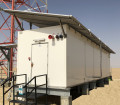
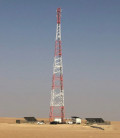
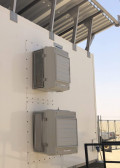
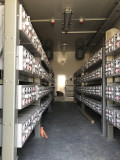
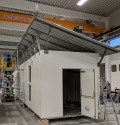

 |
|